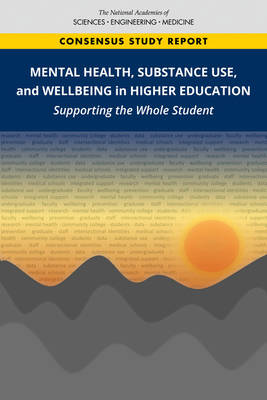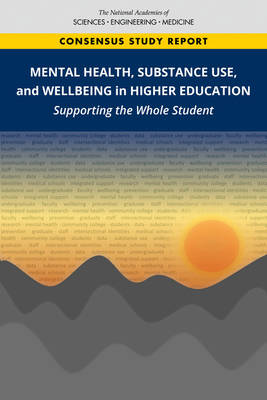
- Retrait gratuit dans votre magasin Club
- 7.000.000 titres dans notre catalogue
- Payer en toute sécurité
- Toujours un magasin près de chez vous
- Retrait gratuit dans votre magasin Club
- 7.000.0000 titres dans notre catalogue
- Payer en toute sécurité
- Toujours un magasin près de chez vous
Mental Health, Substance Use, and Wellbeing in Higher Education
Supporting the Whole Student
National Academies of Sciences Engineering and Medicine, Health and Medicine Division, Policy and Global Affairs, Board on Health Sciences Policy, Board on Higher Education and Workforce, Committee on Mental Health Substance Use and Wellbeing in Stemm Undergraduate and Graduate EducationDescription
Student wellbeing is foundational to academic success. One recent survey of postsecondary educators found that nearly 80 percent believed emotional wellbeing is a "very" or "extremely" important factor in student success. Studies have found the dropout rates for students with a diagnosed mental health problem range from 43 percent to as high as 86 percent. While dealing with stress is a normal part of life, for some students, stress can adversely affect their physical, emotional, and psychological health, particularly given that adolescence and early adulthood are when most mental illnesses are first manifested. In addition to students who may develop mental health challenges during their time in postsecondary education, many students arrive on campus with a mental health problem or having experienced significant trauma in their lives, which can also negatively affect physical, emotional, and psychological wellbeing.
The nation's institutions of higher education are seeing increasing levels of mental illness, substance use and other forms of emotional distress among their students. Some of the problematic trends have been ongoing for decades. Some have been exacerbated by the COVID-19 pandemic and resulting economic consequences. Some are the result of long-festering systemic racism in almost every sphere of American life that are becoming more widely acknowledged throughout society and must, at last, be addressed.
Mental Health, Substance Use, and Wellbeing in Higher Education lays out a variety of possible strategies and approaches to meet increasing demand for mental health and substance use services, based on the available evidence on the nature of the issues and what works in various situations. The recommendations of this report will support the delivery of mental health and wellness services by the nation's institutions of higher education.
Spécifications
Parties prenantes
- Auteur(s) :
- Editeur:
Contenu
- Nombre de pages :
- 212
- Langue:
- Anglais
Caractéristiques
- EAN:
- 9780309124126
- Date de parution :
- 05-03-21
- Format:
- Livre broché
- Format numérique:
- Trade paperback (VS)
- Dimensions :
- 152 mm x 226 mm
- Poids :
- 430 g

Les avis
Nous publions uniquement les avis qui respectent les conditions requises. Consultez nos conditions pour les avis.






